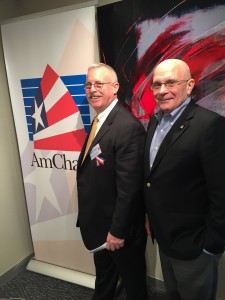With Richard R. Vuylsteke, President, The American Chamber of Commerce in Hong Kong (AmCham).
I had a most interesting luncheon today at the American Chamber of Commerce in Hong Kong. This very active organization sponsors many programs and I was honored to be part of a panel on Trade Policy with a focus on competition law and the Trans-Pacific Partnership Agreement (“TPP”). I was fortunate to learn much from the two other panelists, Professor Bryan Mercurio, Professor and Vice Chancellor’s Outstanding Fellow of the Faculty of Law, Chinese University, Hong Kong, and Brian Bedell, Consul, Economic Affairs U.S. Consulate General, Hong Kong. Their breadth of knowledge about economic activity in Asia was very interesting, as well as was their comments on the TPP.
My contribution was comparatively modest, but I was delighted, and a bit incredulous, to be part of the panel. When I started as baby prosecutor in the Antitrust Division, US Dept. of Justice many years ago, my territory was basically Pennsylvania and half of New Jersey. (And if we wandered into the northern part of New Jersey, the Chief of the New York office, the great Ralph Giordano, would be on the phone in a New York minute. We protected our [legal] territories with great zeal, though thankfully with only verbal assaults.) I digress with fond memories, but by the time I left the Philadelphia office as Chief in 2013, our work was primarily international cartels. And one of those cartels was the parcel tanker ocean shipping cartel prosecution that I led, so it was interesting to talk a little about that to the Transportation and Logistics committee of AmCham, Hong Kong.
Transportation in various forms has been a frequent target of antitrust prosecutions, and not just by the US Dept. of Justice, but also by the EU, Korea, Brazil and many other jurisdictions. Many modes of transportation tend to be in oligopolistic industries where collusion is possible and the lure of profits (or, as is often the case–to try to stop the bleeding of price wars) provides temptation. Additionally, legitimate joint venture agreements, and industry wide exemptions are common, because there are pro-competitive efficiencies to be gained by agreements like code sharing, so competitors are in contact with each other talking about grey area items such as pricing, surcharges and customers. The road (or flight or shipping lane) from a legitimate joint venture or an approved exemption to illegal cartel activity can sometimes be crossed without due concern for the consequences.
And the consequences are real. The United States is the leader in imposing prison sentences for price-fixing/market allocation/bid rigging and with extradition treaties and Interpol Red Notices, the reach of the US antitrust laws is global. But, other jurisdictions around the world have a seat at the cartel enforcement table and impose substantial corporate fines for cartels that effect their consumers. Huge markets such as China and India have also more recently developed significant, sophisticated competition commissions and enforcement agendas.
We discussed that Hong Kong very recently began enforcing its new Competition Ordinance, which I discussed in a prior post here. And the Hong Kong Competition Commission is currently considering a block exemption request submitted by the Hong Kong Shipping Association, also covered in an earlier post here. One of the items we discussed was the pro-competitive, efficiency enhancing benefits that can come result from certain types of competitor cooperation. And the cooperation need not be, and usually isn’t, in the form of an exemption. Joint ventures can be a from of consumer friendly cooperation. One of the reasons competition compliance training is important is to understand not just the “That Shall Not’s” but also the “Yes, you can do that.” Fear of antitrust problems is a legitimate concern, but unwarranted concern shouldn’t chill pro-competitive efforts.
I really enjoyed the Q&A, which continued after lunch. As further evidence of the global nature of competition law, I am now on my way to Tokyo for the American Bar Association International Cartel Workshop. I wish I could have spent a little more time in Hong Kong. Beautiful city.
Thanks for reading.
PS. The nature of my talk and this blog post was general and not intended as legal advice. While competition law has sprouted to over 100 competition agencies around the world, and there is more commonality among competition laws then there are differences, some of those differences are very significant.

